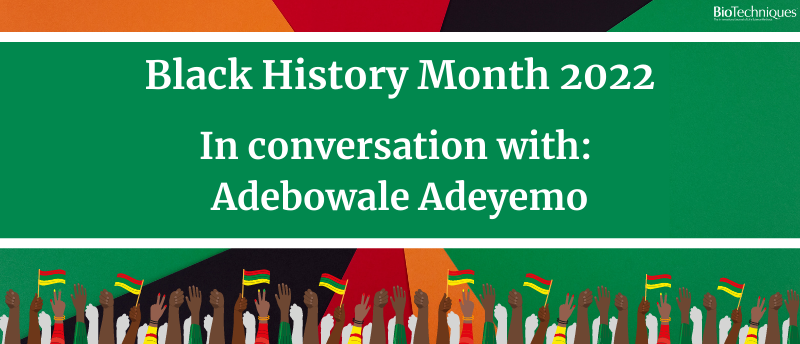In celebration of Black History Month: a conversation with Adebowale Adeyemo

 Adebowale Adeyemo is a genetic epidemiologist at the National Institutes of Health (NIH; MD, USA), who first became interested in genetic research during his pediatric residency. Adeyemo discusses the need for greater diversity in both research participants and scientists in the field of genomics and highlights the importance of mentors throughout his career.
Adebowale Adeyemo is a genetic epidemiologist at the National Institutes of Health (NIH; MD, USA), who first became interested in genetic research during his pediatric residency. Adeyemo discusses the need for greater diversity in both research participants and scientists in the field of genomics and highlights the importance of mentors throughout his career.
Please tell us about yourself and how you got to where you are today
I am a genetic epidemiologist at the NIH, where I am Deputy Director of the Center for Research on Genomics and Global Health and an Associate Investigator at the National Human Genome Research Institute. My research interests lie in the genetic epidemiology of complex diseases and the genomics of populations of African ancestry. My projects include the genetic epidemiology of cardiometabolic diseases (such as diabetes and hypertension) and the genetics of complex childhood diseases.
I qualified in medicine at the University of Ibadan (Nigeria), after which I did a clinical residency in pediatrics. My interest in genetics and genetics research developed while I was a pediatric resident seeing children who suffered from dysmorphic syndromes, chromosomal disorders and monogenic disorders – particularly sickle cell disease, which is common in West and Central Africa. I subsequently underwent training in genetic epidemiology, which served as a foundation for my research career and introduced me to the fields of statistical genetics, bioinformatics and high-performance computing. My first faculty position was at the College of Medicine (University of Ibadan) during which I also served as a consultant pediatrician and geneticist at the University College Hospital. I did genetic epidemiology research at the National Human Genome Center at Howard University (DC, USA) for a few years before I moved to the NIH in 2008.
What is the Human Heredity and Health in Africa Initiative and how did it start?
The Human Heredity and Health in Africa (H3Africa) Initiative was designed to enhance the ability of African scientists to conduct genomic and epidemiologic research to better understand the determinants of various chronic and infectious diseases. The initiative arose out of a partnership between the NIH, the Wellcome Trust (London, UK) and the African Society of Human Genetics. Launched in 2010, this initiative was designed to address the challenges that have led Africa to be under-represented in genomic research and create opportunities for high-quality, collaborative research that will benefit Africa and the rest of mankind.
H3Africa emphasizes collaborative research led by African scientists through awards made directly to African institutions on topics that impact human health in Africa. H3Africa projects span a wide spectrum of noncommunicable diseases (such as stroke, glaucoma and sickle cell disease) and infectious diseases (including trypanosomiasis, tuberculosis and respiratory infections), as well as ethical, legal and social implications (ELSI) topics. The initiative also focuses on human and infrastructural capacity development, including a continental bioinformatics network and several regional biorepositories. As of December 2021, H3Africa has been funded with a total of $176 million that has been used to support 51 projects across 30 countries, enrolled over 100,000 research participants and produced nearly 600 publications. Additionally, over 400 PhD, 407 Masters and 222 Bachelors have been achieved through H3Africa.
How do you hope the genomics research will change in the next decade and beyond?
Genomics is a rapidly moving field, and it is often difficult to anticipate what the field will be like in the next five years, let alone the next decade! Nonetheless, I hope that genomics research will become more inclusive of a greater diversity of populations around the world. Our experience has shown that we have much to learn from historically under-represented populations. For example, in the genetics of type 2 diabetes, one of my areas of interest, some candidate genes including SLC6A11, KCNQ1 and ZRANB3 were identified in these often underrepresented populations.
Alongside a greater diversity in research participants, it would also be great to see a greater diversity of scientists involved in genomic research. I also hope that there will be many more cases of genomic discoveries being translated into clinical practice, for example, the use of polygenic risk scores for disease risk prediction and gene editing and gene therapy for the treatment of severe single-gene disorders such as sickle-cell anemia. Finally, I hope the healthcare workforce will be trained in genomic science, the commoditization of sequencing techniques, clinical decision support and that genomic medicine will become a routine part of medicine.
Are there any key resources or places where you found support when facing challenges in your career?
For me, the key resources that have provided the most support over my career are my mentors. At every stage of my career, I have been lucky to have great mentors who guided me through thick and thin, while challenging me to be the best scientist that I can be. My career in genetics would not have started without Professor Olayemi Omotade and Professor Olugbenro Sodeinde at the University of Ibadan and University College Hospital. I owe an immeasurable debt of gratitude to Dr. Charles Rotimi (currently Scientific Director, National Human Genome Research Institute) and Dr. Richard Cooper (Emeritus Professor, Loyola University; IL, USA), without whom I will probably not be doing genomics research today.
What is your greatest achievement?
Much of genomics research is teamwork, which makes me hesitant to talk about “my” greatest achievement.
However, I am particularly proud of playing major roles in research teams that have conducted landmark genomics studies in Africa, extending the boundaries of our knowledge of specific disorders. Notable among these studies are the first genome-wide association (GWAS) studies for type-2 diabetes in Africa, the first genome analysis for cleft lip/palate in Africa and the first GWAS for a noncommunicable disease in Africa, in podoconiosis or non-filarial elephantiasis. Each of these studies was the first of its kind in Africa and reported discoveries that advanced our understanding of genetic risk factors for each specific disorder. I am also proud to be part of the team that first identified a major locus for steroid-sensitive nephrotic syndrome (a common cause of glomerular disease in children) and of an H3Africa study published in the journal Nature (2020) that advanced our knowledge of genomic diversity and population genomics on the African continent.
What advice would you give to young Black scientists to help them thrive in the scientific field?
To thrive, my first piece of advice is that you should not be afraid to ask big questions or pursue ambitious projects.
Keeping our research questions within the scope of what we think is easily done may be comfortable; however, it often limits our creativity and the potential impact of our work. It is also important to choose good mentors and supervisors as their guidance and support will be invaluable in helping you achieve your research and career goals. Finally, you should always remember why you decided to enter the field. The reason may be intellectual curiosity, a desire for answers about a specific disease, a desire to help your community or a combination of these reasons. Keeping this motivation in mind is often invaluable when you inevitably hit a rough patch.
Is there anything else you’d like to mention?
These are exciting times to be in genomics research. We have access to unprecedented amounts of data, affordable high-throughput sequencing and genotyping technology to characterize the genome, as well as excellent high-performance computing and storage infrastructure to support our research. We should take advantage of these opportunities to design and implement scientific research that is more inclusive and that will benefit all peoples.





